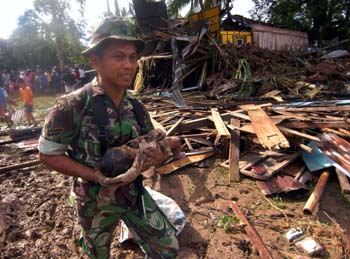Indonesian rescuers scoured mud-filled homes for bodies
and some survivors suffered diarrhoea and skin diseases after landslides and
floods on eastern Sulawesi island killed 210 people, officials said on Thursday.
A search-and-rescue operation has been underway in South Sulawesi province
after two days of heavy rain at the beginning of the week, but officials said
some areas were inaccessible because roads and bridges had been damaged.

A soldier carries the body of a baby from the
flood-swept Sinjai district on Indonesia's eastern Sulawesi island June
21, 2006. Landslides and floods on Indonesia's eastern Sulawesi island
have killed 114 people and the toll could rise further, officials said on
Wednesday. [Reuters] |
Another 104 people were missing in Sinjai regency, the worst-hit area after
flooding early on Tuesday that turned swathes of land into vast lakes.
The Indonesian military, police and civilian search and rescue teams have
been scouring the affected areas trying to recover bodies and digging into mud
from landslides or left behind by the floods to look for survivors.
Rahman Bando, South Sulawesi branch head of the Indonesian Red Cross, said
180 people had died in Sinjai alone and 30 had died in other regencies in the
province.
"We have provided public kitchens and our volunteers are looking for victims.
Several areas are unreachable. Bridges and roads are broken. We walk in the
rivers," he told Reuters by phone from the provincial capital of Makassar.
Makassar is about 1,400 km (870 miles) east of Jakarta.
Torrential rains and landslides are regular features of tropical Indonesia.
"Water is receding. Search and rescue teams keep searching in homes filled
with mud," said Moersen Buana of the disaster task force in Makassar.
"Sanitation is becoming a problem. People can't use regular toilets because
water systems are totally destroyed," he added.
Diarrhoea and skin diseases have begun appearing, Buana said.
Rampant deforestation often adds to the ease with which hillsides are
saturated and collapse as well as to flooding, since the lack of vegetation
means less ground water is retained, environmentalists say.
Sulawesi is resource-rich, with numerous mining operations, but those are far
from the affected areas, a mines ministry official said on Wednesday.
"The landslide is in the south where there is no mining operation. Mining
operations in other areas have no problem," M.S. Marpaung, director of mineral
resources in the mines and energy ministry, told Reuters.
The central government has sent blankets, medicines and sarongs and
instructed local officials to help people move to safer areas.